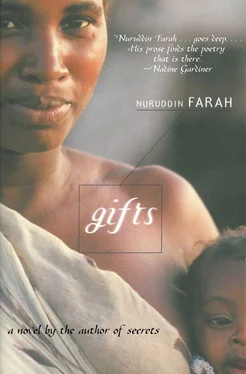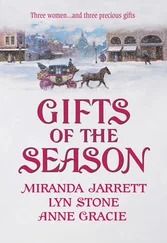Nuruddin Farah - Gifts
Здесь есть возможность читать онлайн «Nuruddin Farah - Gifts» весь текст электронной книги совершенно бесплатно (целиком полную версию без сокращений). В некоторых случаях можно слушать аудио, скачать через торрент в формате fb2 и присутствует краткое содержание. Год выпуска: 2011, Издательство: Arcade Publishing, Жанр: Современная проза, на английском языке. Описание произведения, (предисловие) а так же отзывы посетителей доступны на портале библиотеки ЛибКат.
- Название:Gifts
- Автор:
- Издательство:Arcade Publishing
- Жанр:
- Год:2011
- ISBN:нет данных
- Рейтинг книги:3 / 5. Голосов: 1
-
Избранное:Добавить в избранное
- Отзывы:
-
Ваша оценка:
- 60
- 1
- 2
- 3
- 4
- 5
Gifts: краткое содержание, описание и аннотация
Предлагаем к чтению аннотацию, описание, краткое содержание или предисловие (зависит от того, что написал сам автор книги «Gifts»). Если вы не нашли необходимую информацию о книге — напишите в комментариях, мы постараемся отыскать её.
Gifts — читать онлайн бесплатно полную книгу (весь текст) целиком
Ниже представлен текст книги, разбитый по страницам. Система сохранения места последней прочитанной страницы, позволяет с удобством читать онлайн бесплатно книгу «Gifts», без необходимости каждый раз заново искать на чём Вы остановились. Поставьте закладку, и сможете в любой момент перейти на страницу, на которой закончили чтение.
Интервал:
Закладка:
For Bosaaso the foundling served as an excellent pretext to call at Duniya’s place whenever he pleased. The previous evening he had come as late as ten o’clock and, seeing the lights on and the windows and doors open, had presented himself, half-apologizing. Asked to join them, he had eaten with them an ill-prepared meal. No one stood on formalities. Nasiiba had had the youthful bravura to say to him, “Would you like us to offer you a bed, given how often you are here?” He took the statement in the light-hearted spirit in which it had been made, replying humorously that it would be his honour to accept such generosity, especially from Nasiiba. The elderly woman was there, a welcome participant in the fun and games, and said to him, “But of course she is teasing you.”
The gathering turned into a party, with more people arriving later than Bosaaso and not leaving until after midnight. He was enchanted to make the acquaintance of Marilyn, who bore a definite likeness to her namesake. She, Mataan and Nasiiba took turns preparing and serving kettles of tea, while other neighbours who had come to see the foundling and visit Duniya alternated between despair and optimism, winning or losing their card game. Old Maryam made herself useful by holding the baby or changing his nappy when his stomach ran a mile of diarrhoeal anxiety, as it had done rather frequently, to everyone’s alarm. Duniya was asked her trained opinion as to whether they need worry; she suggested they wait a day.
A group of people consisting primarily of curious neighbours sat in open-air congregation outside their badly ventilated houses, chatting among themselves while watching Duniya’s visitors’ comings and goings with keen interest. Some of them commented on the harmonious fellowship between Duniya’s twins and Bosaaso, and between Duniya herself and Bosaaso.
At about a quarter past midnight Bosaaso had left in his car, returning less than half an hour later with something in a carrier-bag. The onlookers could not tell from where they were if he brought medicine for the baby or food for the adults. But those inside would report that more tea was drunk, more losing or winning hands of cards dealt. In the laughter one might have heard as well as happiness perhaps a touch of tension too. Those present in the foundling’s room might even have caught the quiet looks Duniya and Bosaaso exchanged.
Now he said, shielding his eyes from the sun, “Good morning, Duniya.”
She seemed pleased to see him though, from her red eyes, he guessed she had hardly slept. The house was so quiet, Nasiiba must have gone out already, and Mataan, whose door was shut, must be asleep. A young girl whom Bosaaso had not seen before was washing nappies and towels. Was this the help Marilyn’s grandmother had promised, the loan of a maid, as a stop-gap measure?
“Did you manage to close your eyes at all?” he asked.
“Not long enough to dream,” she said.
His eardrums throbbed with the excitement of his heartbeat. “I wish I could relieve you.” A thoughtful pause. “Why don’t I?”
“Did you get home all right?” she asked.
“I don’t know how, but I did. The car took me home,” he said.
They fell silent, looked at each other, smiled, looked away. Something was making them feel ill at ease. It was apparent in the way they stared, then avoided meeting one another’s gaze.
He said, “Before I forget. What are you doing tonight?”
Her eyes were unfocused, her grasp of time vague. She found herself staring at his long-fingered hands, wanting to touch them. She said, “I’m doing him,” meaning the foundling. “Why? Do you want me to take you to the cinema?”
The radio had been on since before his arrival, and he stared at it now, not listening to its jabber, but as if being reminded of an incident from his past. Duniya explained why she had the radio on: the foundling seemed to have a perverse need to hear uninterrupted, continuous noise; otherwise he burst into a worrisome cry.
“When I got home after two,” Bosaaso said, “I found a note from Mire inviting me to dinner. In a postscript, he wondered if you might like to honour him with your presence — in plain language, if you would like to join us.”
“Why in a PS?” she asked, smiling.
“I suppose he’s not sure about our relationship or if you would accept his invitation. Besides you might think him presumptuous to suggest I bring you along, just like that.”
“Why is that?” she said.
“Maybe if he’d extended a formal invitation to you and you turned it down, he would feel hurt. But if, despite being invited in a PS, which is an afterthought, you still come, then he will feel honoured. I don’t know.”
“What if I don’t go?”
“It will be boring, just him and me.”
“What would you like me to do?”
“It would please me if you came.”
“Then I will.”
They both moved forward as though to embrace, but did not. They felt uncomfortable being alone with each other and wished someone else were with them. Maybe if somebody else joined them, the nervous anxiety would be minimized and the tension generated by their being alone would then assume a certain nobility, bestowed with its own beauty.
Bosaaso appeared eager to leave, and she said, “Please don’t.”
She called to Mataan, who emerged from his room ill-clad in a sarong with a towel draped round his neck and a book in hand. He disappeared on seeing Bosaaso, to reappear shortly thereafter, decently trousered and wearing a UNICEF T-shirt a few sizes too large for him. What would Bosaaso like to have?
“Tea, please. And, Mataan,” Bosaaso said, more at ease now the young man had come on the scene, “I brought some sugar. It’s in a milk-powder tin, on the front passenger seat of my car.” He proffered his car keys, adding, “Could you fetch it?”
Taking no notice of the keys, nor the offer of sugar, an item not easily available in the country, Mataan said, “We have sugar, don’t we, Mother?”
“I believe we do,” she said.
Mataan’s eyes were on her, solicitous. He didn’t wish to offend anyone, not least his mother, remembering previous occasions when he had brought into the house gifts of which she disapproved.
She said, “Could you find a cake of soap for the young help so she can wash her own robe? You know where we keep laundry-soap, in the top cupboard of your room; and on the shelf directly below that you’ll find sugar, if there’s none in the kitchen.”
“Yes, Mother,” Mataan replied, and turned to leave.
Bosaaso displayed slight disappointment at his gifts being rejected. He was at once anxious and relaxed, both happy and unhappy. “Mataan?” he called.
“Yes?”
“I’ll come and give you a hand.” He didn’t want to be alone with Duniya. At least for the time being, he preferred her son’s company to hers.
“It’s not necessary,” Mataan said.
“I’ll come all the same.” And the two men walked away side by side, towards the kitchen, a small cubicle, resembling an out-house, and next to it, a shower-place whose walls, Bosaaso noticed, had water-stains, dark as silver.
Duniya thought that marriage was a place she had been to twice already, but love was a palace she hadn’t had the opportunity to set foot in before now. If what she and Bosaaso were doing was the beginning of a long courtship that might eventually lead to such a many-roomed mansion of love, so be it. So far she had only seen glimpses of it, in a rear-view mirror, in the eyes of a driver who wasn’t a taxi-driver. Prior to that she had seen signs of it, in a dream, fuzzy in shape as a butterfly in zig-zag motion. Granted, she had since then feasted on moments full of rejoicing, in glances furtively delivered and withheld from public recognition. There was no rush, she said to herself. They had all the time in the world to explore the depths of their feelings for one another.
Читать дальшеИнтервал:
Закладка:
Похожие книги на «Gifts»
Представляем Вашему вниманию похожие книги на «Gifts» списком для выбора. Мы отобрали схожую по названию и смыслу литературу в надежде предоставить читателям больше вариантов отыскать новые, интересные, ещё непрочитанные произведения.
Обсуждение, отзывы о книге «Gifts» и просто собственные мнения читателей. Оставьте ваши комментарии, напишите, что Вы думаете о произведении, его смысле или главных героях. Укажите что конкретно понравилось, а что нет, и почему Вы так считаете.











